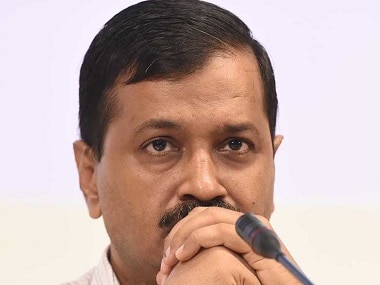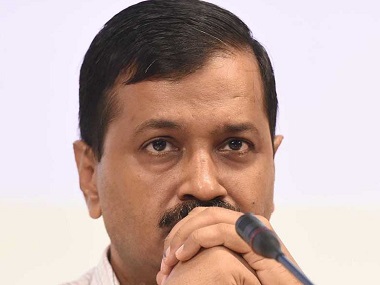The Comptroller and Auditor General (CAG) report that was tabled in Delhi Assembly on Tuesday highlighted ‘lapses’ in the public distribution system (PDS): It found that eight vehicles which ferried 1,589.92 quintals of specified food articles to fair price shops had registration number of buses, scooters, motorcycles and three-wheelers. To understand why Chief Minister Arvind Kejriwal has blamed Lieutenant Governor Anil Baijal for ‘protecting’ the ration mafia in Delhi by halting the implementation of Delhi government’s doorstep ration delivery scheme and other such progressive ideas citing purely procedural issues, one needs to carefully read Delhi’s doorstep delivery of ration story and the roadblocks it has faced along the way. [caption id=“attachment_4393385” align=“alignleft” width=“380”]  File image of Delhi chief minister Arvind Kejriwal. Getty Images[/caption] The conceptualisation of India’s food security system was in the backdrop of the Bengal famine and depleted resources after World War II. A malnourished and underdeveloped population in India faced structural violence in the absence of food security. Over the decades, several measures in poverty alleviation were tried by a centralised government which never saw the efficiency gains from decentralising power or devolving finances. The ideas that have served other countries so well are thus stuck in a muddy swamp of disrepute pushed by aggressive propaganda in India. False binaries and nomenclature like subsidies and doles definitely don’t help its cause. However, the impact and reach of India’s PDS, with over 600,000 shops distributing food grains and other essentials could have been and can be immense.
There are numerous Planning Commission reports and working groups and activists working on the issue through the years, with some of the finest ideas of poverty alleviation and human development. And yet, the poor are poorer.
The Government of India procures, stocks and distributes essential food grain, sugar and edible oils through Fair Price Shops, with a tangential goal of providing minimum support prices that stabilise farm output and income. Over the years, our farmers have become the poorest of the poor, cities are subject to large-scale migration leading to increased inequality and the lack of multiple engines of growth means that economic violence is decentralised in nature but aggregates near cities. Delhi’s tryst with public distribution hasn’t been different to the rest of India with rapid changes in geographies and demographics with centralised governance and bad politics at the heart of the problem. In 1961, Delhi had 2.7 million citizens in 326 square kilometres. The next 50 years saw a ten-fold increase in population in the national capital region (NCR) and only a four-fold increase in area. The pressure on Delhi’s resources is immense. This is what led to the creation of an elected government in 1993, one that would protect Delhi’s citizens and their rights through democratic accountability. https://twitter.com/ArvindKejriwal/status/981143047294644224 Within the Delhi government, the Department of Food and Civil Supplies implements the public distribution system (PDS) through a network of 2,254 Fair Price Shops catering to an active base of approximately 19.50 lakh ration card holders across all strata of the population. The National Food Security Act, 2013, implementation covers approximately 72.78 lakh people in Delhi. That is, in theory. The reality on ground is that the food and essential item distribution has been limited and features of irregular periodicity, insufficient quantity and poor quality. The lack of rule of law by the Delhi Police means deceitful dealers replacing FCI supplies with inferior stock, bogus card ownership, political nexus of FPS ownership and black marketing which has killed the goals of price stabilisation and made nutritious food inaccessible to the common citizen. The private markets, de facto, provide the majority of Delhi’s food.
This is the reality that was inherited by the Aam Aadmi Party government that had the hopes of millions of common citizens attached to it.
It first attempted four major innovations to tackle the problem despite the sustained attacks from political rivals, which are documented here:
- http://delhi.gov.in/wps/wcm/connect/doit_publicity/Information+and+Publicity/Press+Release/Chief+Minister/ 2. https://aapdelhidiary.wordpress.com/ 3. https://indianpoliticsandpolicy.wordpress.com/ 4. http://www.aaptracker.in/
First, it introduced transformation amendments to the Right of Citizen to Time Bound Delivery of Service which transferred the burden of proof from the citizen to the State. It gave clear timelines for services, mandatory and automatic compensation for delays and mandated the citizen’s charter on government offices. Food and civil supplies, which was a place where citizens are vulnerable to officers for their physiological needs, were policy areas where this would have been transformational. Second, it had massive anti-corruption efforts which involved more than 150 arrests and FIRs into various corrupt officers and officials through its anti-corruption bureau, which showed that anti-corruption efforts of Hong Kong and Singapore were replicable with strong political will. FPS owners knew that despite not having the Delhi Police under its control, the Aam Aadmi Party would not stand for the infringement of rights and freedoms of citizens. Third, Deputy Chief Minister Manish Sisodia emphasised on outcomes and outputs as governance measures by presenting outcome budgets for every line item that the government spent. Measurement of efficacy and effectiveness of the PDS as well as accountability of officers towards ensuring its philosophical outcome: Minimising human suffering through the provision of food security. Fourth, process innovations utilising technology were piloted. Aadhaar-based point of sale services were tried but stopped temporarily after discrepancies in distribution and philosophical disagreements about it being mandatory given its weak architecture and privacy flaws. In this political economy, Kejriwal didn’t have control of land, police or law and order; had his constitutionally valid anti-corruption bureau taken away via an illegal order; his democratic powers curtailed through a high court order and given to a nominated head of the BJP central government which included the services department and several roadblocks from the corporate-politics-mafia nexus in policy innovations.
He was reduced to a CEO with no hire/fire powers attempting to shape an organisation’s priorities with the resources and processes in control of his political rivals.
And yet the innovative young team of technologists working in the Chief Minister’s Office led by Gopal Mohan and Vijay Chandra Vupputuri, inputs from the Public Grievance Management System and Delhi Dialogue Commission and guidance from some committed bureaucrats in the Delhi government delivered a progressive governance model that disrupts the political economy of food. If Amazon and Pizza Hut can exist, why can’t an Uber for Public Distribution of Food? By engaging in sustaining governance innovation which India lacks, the new gauntlet thrown by the central government had another solution: Doorstep delivery of ration and food grain. Doorstep delivery reduces interface touch-points of governance, removes the stakeholders of the existing political economy from key decision-making on resource allocation and can bring in efficiency to a broken system. Making the system efficient first would allow it to bring additional capacity of augmented social welfare programs in the long run to delivered desired goals as opposed to dumping further money into a broken system. The use of information technology in the Food and Civil Supplies department had been minimal. The Delhi government also attempted to fast-track the computerisation of services within its information technology architecture, which were long-promised goals of the IT revolution still unseen. The IT Department under the AAP government mapped 345 services from multiple departments and functions and mapped its front-end delivery, monitoring technology, back-end enablement and progress over multiple metrics. As its E-District project matured, several key services including those in food distribution were brought to stage-1 for deployment. There were nine key functional services related to ration cards that were brought online to ensure that there was no need to depend on Aadhaar solely for identification. The Aam Aadmi Party’s doorstep delivery project in ration and food distribution seeks to learn from the best of business in logistics and supply chain management with clear demarcated checkpoints for accountable service delivery. This would also eliminate the political actors and their ration mafia associates at the lowest level from pilfering food and supplies that are necessary for minimum dignity of a citizen. AAP’s Delhi government pushed for the devolution of funds and decentralisation of power structures, both known to be clear governance wins, but has been stymied till now by the Lieutenant Governor’s Office at the behest of the Ministry of Home Affairs controlled by the BJP. However, by making the common citizen the pivot for governance, it has attempted to mark a cultural shift in attitude in a short period of time. The writer works with the Aam Aadmi Party and the Delhi government on policy issues.


)
)
)
)
)
)
)
)
)



